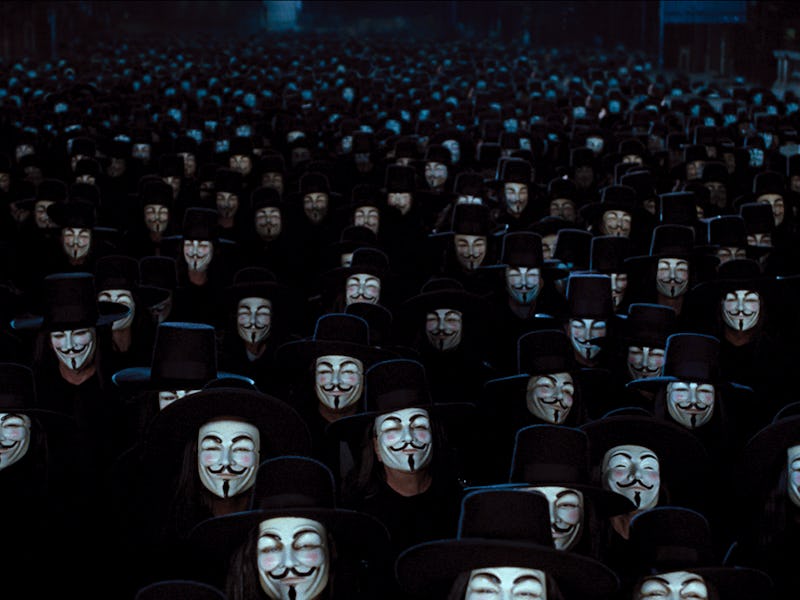10 Years Later, 'V For Vendetta' Is One of the Millennium's Most Influential Action Films
It's not just the Fawkes mask's appropriation by Anonymous, but the movie's influence on blockbuster films in general.

Memes, muck-racking amateur YouTubers, the hacker collective Anonymous, Occupy, and even Wikileaks’ Julian Assange have made the so-called V mask a persistent cultural symbol for rebellion against autocratic authority. It keeps not only the memory alive of Alan Moore’s second most beloved graphic novel, but reflects the lasting impact of the Wachowskis’feature film, which brought the book’s universe to the masses. This week, the film turns ten, which offers an opportunity to appreciate the ways its imagery and themes have penetrated media and culture.
There was healthy blowback from anarchist groups and Moore fans (the author refused to watch the movie, or be paid for it) directly after the release of the film, protested, among other things, that the movie adaptation wasn’t bloodthirsty or unrepentant enough. The brutality of the society was, in their view, toned down, and nefarious imperfections in nearly all of the characters smoothed over.
Anarchy became a sidebar to an ultimately more populist, optimistic theme of hope. The movie version implies that there is a way out of politically oppressive situations if people realize that by giving into their fear, they are just as bad as the criminals who create the power structures in the first place. Despite their market-friendly correctives, V for Vendetta still felt much darker and morally chaotic than your average Hollywood film, let alone than typical comic book adaptations. By featuring several prominent queer characters, and unsparingly violent images of persecution, it also felt more progressive.
The Wachowskis grafted their usual pseudo-philosophical overtones onto Moore’s politically charged text, and played up the ones that were already there, including Moore’s argument against the coincidence. Take for instance, the flowery monologuing (Blade Runner-style) when Evey (Natalie Portman) wanders into the rain after her staged prison sentence, or the montage while the “terrorist” V (Hugo Weaving) topples his elaborate, egomaniacal domino arrangement. Everything is connected, get it man? The film draws a line between the Wachowskis’ earlier work and other self-consciously heady turn-of-the-millennium thrillers like Fight Club or Dark City with The Dark Knight, the Daniel Craig Bond films, and the domestic terrorism-laced action flicks of the late 00s and beyond: the kind where the bad guys’ militias wear clown masks, and every villain explains their ideology, borne of a tortured childhood, during the climax.
Batman Begins and V for Vendetta, in this way, stand as two of the most influential blockbuster films of last decade. Their philo-101 overtones, bleak view of humanity and societal constructs, and focus on the villain’s origin story as a key to understanding their idealistic madness anticipated the tone of many of the action and superhero films that have come in its wake. The hit Captain America franchise packs in totalitarian overtones and neatly packaged, moral ambiguities; once considered an arty gambit, “cryptofascism” has become part of the bulwark of Hollywood adventure films; the new Batman v Superman is steeped in it, and the Avengers are going to war over it in May. Vendetta helped define the landscape of blockbuster film as it stands today, in which a certain seriousness in tone, pseudo-realism, dizzying action, and indulgent length are hallmarks of the industry.
In addition to its significance in modern film history, Vendetta was prescient in regards to the real world, too (which, undoubtedly, recent blockbusters have also channeled in crafting their scripts). More than anything, it’s V’s obsession with the power of Trump-like words and theater that is most pertinent to today’s frightening political reality. “Symbols are nothing without people, V sneers at one point, while McTeigue snaps back and forth between fascistic images of the campaign of High Chancellor Sutler (John Hurt).
In the film, the ultimate conflict is between rhetoric, celebrity, and posturing, and deep-seated convictions, concrete action and — of course — the collective will. Fear, bred by empty but imposing rhetoric, can suck the conviction and idealism out of a person. “Behind this mask is an idea, Mr. McCready. And ideas are bulletproof,” our troubling hero says during the film’s climactic fight. “I’ll fix it,” says Trump, without suggesting a real way to do so, and so many anchor their value systems to him, by virtue of the confidence of his presentation. In the film, refusing to interrogate the mechanisms behind a piece of political or cultural theater is the most dangerous action an individual can take. Never consent blindly without knowing what star you’re hitching your wagon to (plenty of libertarians love this movie too).
So V for Vendetta’s view of a post-G.W. Bush world comes back to intersect with the possibility for a reactive, post-Obama one. V for Vendetta set up archetypes which will no doubt continue to be relevant for decades to come, just like the Guy Fawkes narrative for V.